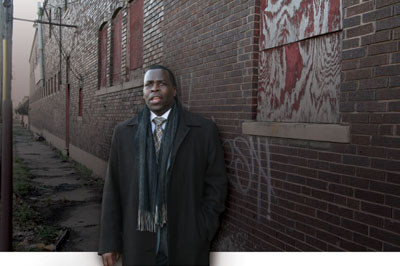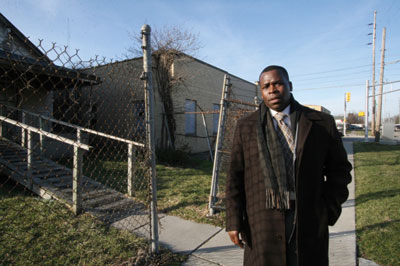Pursuing Justice
by Howard Hewitt April 9, 2008
Dr. Martin Luther King said, "The ultimate measure of a man is not where he stands in moments of comfort and convenience, but where he stands at times of challenge and controversy."
Keith Veal had planned a life of relative comfort, but the 37-year-old Indianapolis African-American entrepreneur has faced challenges few men could have overcome.
A good student who wanted to be a doctor, Veal escaped a tough Indianapolis neighborhood. The poorest, most crime-ridden area of Marion County consumed many of his friends. Veal was a victim as well, not once, but twice.
He was arrested by Indianapolis police in 1991 and again in 1995 on a variety of charges. Although he was exonerated in both incidents, the arrests soiled his reputation and cost him a chance at medical school.
He went to work for the Indiana Blood Center, moved to the Indiana Department of Environmental Manage-ment as a chemist and would eventually become one of IDEM’s top leaders. Later he went to work in Mayor Bart Peterson’s administration and learned about economic development, experience that helped him develop the
Today he is helping communities clean up and redevelop Brownfields—abandoned or under-used industrial/ commercial sites where redevelopment is complicated by real or perceived contamination—with a particular focus on environmental justice.
The injustice he suffered in the 90s cost him medical school, but it also fired a passion to help others. When the opportunity to become a doctor slipped away, Veal knew his calling to help people didn’t disappear with that life-long dream.
Instead, he’s focused on improving neighborhoods and helping other young African Americans and their families strengthen their lives and communities.
Veal wanted to be a physician from the time he was a little boy. He worked hard in school. He tested out of French and mathematics when he arrived at Wabash, where he majored in biology, sang in the Glee Club, and was a member of the Malcolm X Institute. He completed his independent research project with Professor Aus Brooks, won the College’s Harrison Award for the best essay in American Studies, worked summer internships and programs at Indiana University, and was on the verge of being accepted to medical school there.
But in the summer of 1991, between his junior and senior years, "the most profound event of my life happened," Veal says. "I was arrested."
Veal was at home on his parent’s front porch when the police came looking for his brother. About all Veal says he remembers of the incident, after police approached the porch, was being beaten.
He was charged with various counts, including felonies. The trial took place during his senior year at Wabash, and Veal was eventually acquitted.
He fought to get into medical school during his ordeal, but the arrest and trial had been widely publicized. He believes the IU Medical School selection committee may have been concerned that this would be a distraction.
As it turned out, the selection committee wasn’t far off. In 1995, Veal found him- self once again in police custody.
"Believe it or not, the same thing happened," he says, shaking his head in disbelief more than a decade after the incident. "I share this with some folks and they look at me with an arched brow."
Veal says that, with some help from a compassionate judge, he made it through another difficult chapter. Although the nightmare was over, a year later he would still be unable to gain acceptance to medical school.
His experience in the justice system led him to new career goals.
"I got interested in politics and became crazy ambitious," Veal explains. "I wanted to keep this from happening to other Keith Veals.
"I had wanted to be a doctor because I wanted to help people. What I came to realize was that my calling is to help people; my career goal was to be a doctor. That’s how I started to rationalize my life. Your career goal may change, but your calling is always the same."
He spent nine years with the Depart-ment of Environmental Management. He worked his way up from chemist to leading the department’s environmental justice efforts. In his own words, he became the face of environmental justice in Indiana.
"Environmental justice is the convergence of the civil rights movement of the 60s and 70s and the environmental movement of the 80s," he explains when pressed for a concise definition. "The pre-mise of environmental justice is simply that low income people and people of color receive a disproportionate share of the burden when it comes to the impact of environmental decision making. They get dumped on."
Veal cites examples going as far back as Love Canal, a neighborhood in Niagara Falls, NY, where a housing development had been built on land that contained toxic waste. The national controversy reached a boiling point in 1979 when the EPA linked residents’ medical problems, including skyrocketing cancer rates, to the buried contaminants. Public outcry and a media frenzy eventually led to a resolution, but thousands of working class neighborhoods across the country continue to be plagued with environmental contaminants.
"Environmental justice is a movement where poor people and people of color are trying to gain equal protection under the law and have a say in the decisions that shape their community," Veal explains.
It’s a belief most Americans share, but few act upon.
Keith Veal is one of those few. Sustain-able Solutions combines the principles of environmental justice with the potential economic benefit of redeveloping the hundreds of Brownfield sites. He sees endless opportunities to not just clean up an abandoned factory or business, but to clean the site and improve the neighborhood by giving residents a say and encouraging developers to participate.
His first step is looking at an area and determining what buildings can be redeveloped.
"We want these properties back on the tax roles," he says. "We want them contrib-uting to a healthy sustainable community instead of being a drain."
He is currently involved with the Speedway project to totally redevelop 16th Street near the Indianapolis Motor Speedway. He’s working on projects in the Martin-dale-Brightwood neighborhood where he grew up, as well.
But it’s a project Veal witnessed before he formed Sustainable Solutions that best illustrates Veal’s ability to merge environmental justice with Brownfield redevelopment.
The city was redeveloping an area of land in the Bright-wood neighborhood for light industry. A number of homes on the property were either boarded up or minimally inhabitable. The city offered property owners $25,000, a fair market price.
But in meetings Veal challenged the decision makers to think beyond the factory buildings.
"You’ve given these folks $25,000," he told them. "This is the highest area per capita of unemployment, lowest education level achieved, highest crime rate—the bottom of the demographic. Where can a person, at the bottom of the demographic, go find their way out with $25,000? No where —they’ve been displaced."
Veal’s solution was to use part of the $25,000 to temporarily house the residents. Then use a very small portion of the land and the remainder of the money to build simple homes and assist in the financing. Additional funds would be necessary, but those residents would return to their homes with hope, a better neighborhood, and become the workforce for the new employers.
The decision makers admitted it was a good idea, but too late.
By founding Sustainable Solutions in 2005, Veal now hopes to get in early on projects like these. He would like to grow the company to five or more employees, then split off and focus his own work more on the Brownfields redevelopment side.
As the owner of a young business, Veal is asked frequently about his goals. He often answered in terms of the number of employees or total revenue until, Veal says, a long-time mentor corrected his thinking.
"No, no, no," his mentor told him. "Measure your success by the quality of the project and your involvement in it."
Veal has taken that advice and extended it to the community, pouring his energy not only into Sustainable Solutions, but also relishing his work with youth at the Center for Leadership Development, and, as a director with the Indianapolis Urban League, personifying that group’s mission of "empowering communities, changing lives."
Unwilling to remain a victim of injustice, he pursues justice for those the economic and legal systems overlook or treat unfairly, "other Keith Veals out there" in need of an advocate.
"I never envisioned being an entrepreneur or owning my own business," says the man whose original career goal was to be a doctor so that he could help people.
As Veal himself says, the career goal may change, but the calling remains the same. |

|

 The injustice Keith Veal '92 suffered cost him a shot at medical school, but it also ignited a passion to help others.
The injustice Keith Veal '92 suffered cost him a shot at medical school, but it also ignited a passion to help others. Then Veal establishes a plan for cleaning up of the site and redevelopment, and he acts as a project manager throughout. He’ll recommend firms for the labor and suggest ideas to make the project beneficial to the surrounding community.
Then Veal establishes a plan for cleaning up of the site and redevelopment, and he acts as a project manager throughout. He’ll recommend firms for the labor and suggest ideas to make the project beneficial to the surrounding community.




























